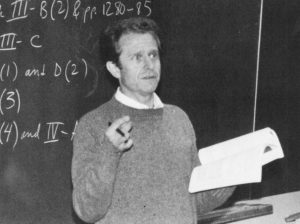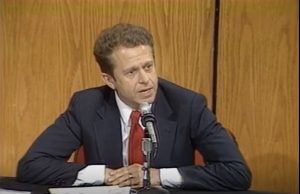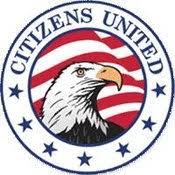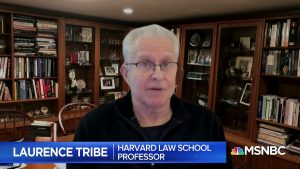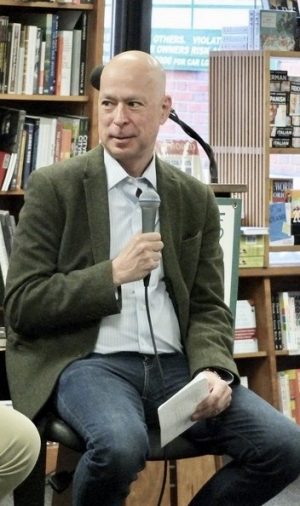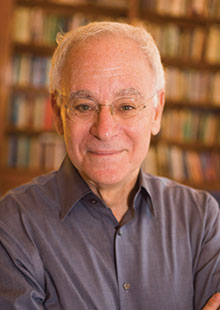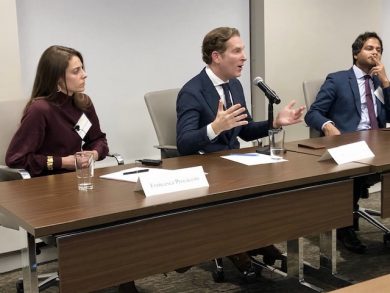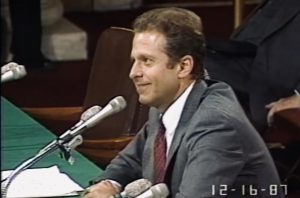First Amendment News 300: A Q&A interview with Laurence Tribe on freedom of expression
“Few if any (on the bench, in the profession, or in the academy) have contributed more to our understanding of the First Amendment than has Laurence Tribe. Through his unparalleled record of scholarship and advocacy, Professor Tribe has done much to secure broad judicial and legislative protections for the full range of First Amendment freedoms.” — Robert Corn-Revere
* * * *
To commemorate the 300th posting of First Amendment News, I invited Professor Laurence Tribe, the Carl M. Loeb University Professor and Professor of Constitutional Law (emeritus), to participate in a “Question and Answer” exchange. He kindly agreed.
While many in the legal community and related fields know of his enormous impact on American constitutional law (see e.g. here, here, here, and here), few are familiar with his notable contributions to the development of freedom of speech and press law as expressed in the 11 such cases he argued in the Supreme Court, his scholarly and popular writings, his social media and cable TV comments, and the various testimonials he made before Congress and elsewhere. Many of his accomplishments are cataloged in a previous FAN post.
This interview was conducted via email and has been lightly edited for clarity.
Thoughts on a metatheory of free speech
Question: Some four-plus decades ago, you argued for a metatheory of free speech that “must include elements in at least four dimensions:”
- “First, it must describe the premises on which a free speech theory ought to draw; it must address what sorts of premises are admissible.”
- “Second, it must take a position on the structure a free speech theory ought to possess; it must describe what sort of architecture a free speech theory may employ.”
- “Third, the metatheory must identify a set of acceptable methods; it must express a view on the modes of argument and analysis a free speech theory should be allowed to invoke.”
- “And fourth, the metatheory must specify some boundaries of content and substance; it must set the perimeters of the thinkable within which any free speech theory must fit.”
You closed that essay by declaring that “[t]his sketch of criteria for a satisfactory free speech theory is doubtless incomplete, but its elements seem to me necessary even if insufficient. Even more clearly, it seems to me vital that theory-builders throughout constitutional law, and throughout law generally, pay more attention to what an acceptable theory must contain.” Laurence Tribe, “Toward a Metatheory of Free Speech” in Ronald Collins, “Constitutional Government in America” (1980), pp. 2, 5 (emphasis in original).
When it comes to free speech theory, has any real progress been made either at the judicial level or in the scholarly literature in the 41 years since you wrote that essay?
Tribe: Absolutely. Both the theory and metatheory of free speech — particularly as reflected in the scholarly literature, although much less so at the judicial level — have become far richer, more self-questioning, more attentive to methodological options and their relative strengths and weaknesses, more inclined to probe the moral and political premises underlying competing conceptions of the freedom of speech and its limits, more sensitive to the intersections between the libertarian strand of free speech doctrine and the egalitarian strand (or, more often, the lack of the latter), less inclined to assume that one overarching conception of free speech is preferable to distinct conceptions matched to distinct social and economic realms, and considerably less tethered to particular canonical decisions like Brandenburg v. Ohio, New York Times v. Sullivan, and Citizens United v. FEC.
“I . . . recall how odd it felt to be asked a series of questions by Potter Stewart, the Justice for whom I had clerked a dozen or so years earlier.” — Laurence Tribe (2003)
Question: Richmond Newspapers v. Virginia was the first case you argued (February 19, 1980) in the Supreme Court. How did the case find its way to your door, how did you convince the parties to seek review, and how did you persuade the Court to hear the case?
Tribe: I was delivering a lecture in Chicago and discussing, as I recall, the importance of understanding issues arising under the Freedom of Speech, Freedom of Press, and Freedom of Assembly Clauses in relation to one another rather than in clearly divided silos; as well as the difficulty of translating the essential elements of an open democratic society into free speech doctrines that depend on the presence of a willing speaker, given the frequency with which those in possession of information that ought to be broadly available have no incentive to share it and instead have an incentive to operate in the dark vis-à-vis the broader public. I might even have mentioned the kind of examples I had in mind, in terms of prison secrecy and courtroom secrecy, and the fact that the First Amendment is not, has never been, and can never become, the constitutional equivalent of a Freedom of Information Act.
One of the attorneys in the audience came up to me after my lecture and following the Q&A period and mentioned that he was counsel for the Richmond Newspapers in a fascinating case arising out of a murder trial in Hanover County, Virginia, where his client had been barred from the courtroom by a trial judge who, with the enthusiastic agreement of both the prosecution and the defense, had insisted that the proceedings in which he was about to dismiss the charges against the accused ought to be kept from public view and even from viewing by the family of the murder victim. It didn’t take long for me to convince counsel for the newspaper that the case was clearly worthy of Supreme Court review in light of the still-recent Gannett decision, where the Court had split in interesting ways over the reach of the Sixth Amendment right to a public trial where the accused wants the proceedings to be open to public view rather than conducted in what amounted to secrecy.
I explained how I saw the issues differently from the way the First Amendment bar that typically represented media clients saw the issues, that mine was a more systemic approach focused not just on preventing government interference with the flow of truthful information from journalists eager to publish it to a public interested in reading or viewing it but on the prerequisites of the kind of open society that the First Amendment presupposed.
I told the Richmond Newspapers’ attorney that, in my view, the case would be a perfect one in which to challenge not just the particular ruling by the trial judge but the way the Virginia statute under which the judge issued his ruling impermissibly gave a government official control over which trials the public could witness first-hand and which it had to learn about only by reading a cold transcript after the fact. It also helped that I told the newspaper’s attorney that I would charge little or nothing for my legal services. What I didn’t tell him, as I recall, was that this would be my first Supreme Court argument! At any rate, after a further meeting with the attorney and the in-house counsel for the newspaper, I was asked to handle the appeal to the Supreme Court, including all briefing and argument.
As for persuading the Court to hear the case, my recollection is that I emphasized the importance of the issues left open in Gannett and positioned the case as one falling within what was at the time part of the Court’s mandatory appeals jurisdiction, which encompassed cases in which a state statute had been upheld by the highest court of a state that rejected a federal constitutional challenge to the statute. The Virginia Supreme Court had rejected the First and Sixth Amendment challenge made at trial to the state statute as applied, and I argued that it made no difference that the statute wasn’t being challenged on its face and emphasized the recurring nature of the issue in arguing that the case wasn’t mooted by the fact that the trial had ended.
Question: One of the novel arguments you made in your Richmond Newspapers brief to the Court was a Ninth Amendment argument, one that got the attention of several members of the Court. Tell us about how you came to craft that argument and why you thought that the “First Amendment didn’t completely suffice” to carry the day?
Tribe: I thought the First Amendment didn’t completely suffice because there was no “willing speaker” with whose communications any Virginia official was interfering. Because the man on trial for murder, the state prosecutor, and the trial judge all wanted the courtroom to be closed, there was nobody who was trying to “speak” to the public through the Richmond Newspapers. Nobody’s speech was being silenced, censored, or even chilled.
It’s true that because the Court had previously held that a criminal defendant has a right to a public trial but no automatic right to a private trial — because the Sixth Amendment’s right had been construed as a one-way street — the trial judge was playing a role one might describe as censorial in the sense that he was deciding which requests for trial closure by someone accused of a crime to grant and which to deny. But that seemed to me a rather thin reed on which to hang a purely First Amendment right in the case at hand, because there was no record suggesting that the trial court was engaged in a pattern or practice of selectively deciding to close just those trials, among ones in which the defendant wanted to avoid the public’s gaze, whose content the court wanted to filter out of public discourse.
Under those circumstances, I thought it essential to argue, invoking the Ninth Amendment’s rule of construction, that the right of the press and public to observe criminal trials generally, whatever the accused might want and whatever the prosecution and trial judge might want, was among those rights historically taken for granted under our constitutional system and that the failure of any provision of the Bill of Rights specifically to enumerate that right could not be deemed decisive. It was, I believed and the plurality agreed, a right that literally “went without saying.”
Question: 18 years ago you wrote: “Richmond Newspapers became a landmark, albeit not one whose final shape can yet be drawn with any real authority.” What did you mean by that and what future, if any, do you think the Ninth Amendment has in constitutional jurisprudence?
Note: There is a deeply personal story, which can be found here, of the death of Tribe’s father on the eve of oral arguments in the Richmond Newspapers case and how it influenced the way he argued the case.
Tribe: I meant simply that I hoped and assumed that the case would be broadened to cover civil as well as criminal proceedings and that the Ninth Amendment would before long be invoked not only in a plurality opinion, the way it was invoked in Chief Justice Burger’s plurality in Richmond Newspapers, but in an opinion for the Court, as it ultimately was, albeit without elaboration, in Planned Parenthood v. Casey a dozen years after Richmond.
Campaign finance cases
Question: You have written that you believe that Citizens United v. Federal Election Commission (2010) “was rightly decided.” Even so, you maintain that it “represents a bizarrely cramped and naïve vision of political corruption and improper influence in the electoral process — one that has become characteristic of Roberts Court campaign finance law.”
How can that opinion be right and naïve at the same time? Might you elaborate on that?
Tribe: On the facts of the Citizens United case, it seemed [that way] to me, for reasons I explained at length in my piece in “Constitutional Commentary.” Forbidding the publication of the video critical of Hillary Clinton just because of an election in which she was a candidate and because the publication was critical of Ms. Clinton constituted viewpoint-based censorship. The First Amendment should be understood to prohibit that regardless of whether the publisher was an individual or a corporation.
Even those who say Citizens United was wrong in its bottom line seem to agree that, had the Citizens United corporation (a nonprofit, by the way) been publishing a book or magazine rather than a video, the case should have come out in favor of publication. I just can’t see distinguishing on the basis of whether the publication is between hardcovers or needs to be played on a computer or a video machine.
At the same time, I was and remain highly critical of the needless and implausible sweeping statements made in the majority opinion by Justice Kennedy, including the statements counterfactually insisting that large political expenditures by wealthy corporations or individuals simply “cannot” corruptly influence the candidates they benefit so long as they are made by PACs that are technically independent of those candidates. Those dicta went beyond anything the case required the Court to decide and have caused great harm by making it nearly impossible, even when the political will is there to do so, for legislatures to limit the distortion of our politics by the deepest pockets around. So the narrow holding was right but the broad opinion was naïve and wrong.
Question: What is your opinion of McCutcheon v. Federal Election Commission (2014)? Was it also rightly decided?
Tribe: I’ve not thought about McCutcheon in the last few years, but as I recall I thought that the Roberts opinion was at least defensible and probably right insofar as it held that the aggregate limits at issue operated to penalize those who stay within the statutory limits on how much they may contribute to any individual candidate but choose to spread their contributions over a larger number of candidates. I found it persuasive when the Court reasoned that “the Government may no more restrict how many candidates or causes a donor may support than it may tell a newspaper how many candidates it may endorse.”
As the Chief Justice put it in his opinion: “To require one person to contribute at lower levels than others because he wants to support more candidates or causes is to impose a special burden on broader participation in the democratic process.” That holding is of a piece with some of what Roberts has done with the unconstitutional conditions doctrine in cases like Agency for International Development v. Alliance for Open Society International, a decision I praised in my book, “Uncertain Justice: The Roberts Court and the Constitution.”
Question: You’ve argued that “state and local governments need to close the foreign corporate political spending loophole.” What is that loophole, how did it come to exist, and how significant is it?
Tribe: Federal law (52 USC §30121(a)) currently forbids foreign nationals from spending money on federal, state, or local elections. The Supreme Court summarily upheld that ban against a post-Citizens United constitutional challenge in Bluman v. FEC (2012) on the theory that, as then-Judge Bret Kavanaugh reasoned in the opinion below for the D.C. Circuit, “foreign citizens do not have a constitutional right to participate in, and thus may be excluded from, activities of democratic self-government.” However, corporations that are majority-owned by foreign investors were liberated by Citizens United to spend without limit supporting or opposing candidates in American elections. Their ability to do so enables the foreign citizens excluded from our politics by §30121(a) to circumvent that exclusion by operating through the corporate form.
That’s the loophole I was arguing ought to be closed. If Congress won’t close it, then state and local governments can do so through measures I argued in a 2020 letter I wrote to the Seattle City Council. The current Court ought to uphold the strength of Bluman. Justice Alito in particular, who was seen to mumble “Not true” when President Obama, shortly after the Court decided Citizens United, decried the way that decision would enable foreign money to influence U.S. elections, ought to be in favor of such a loophole-closing ruling.
The right not to speak
Question: In a 2001 article you wrote: “The right that all of [the right not to speak] cases affirm is better understood as a right not to be used or commandeered to do the state’s ideological bidding by having to mouth, convey, embody, or sponsor a message, especially the state’s message, with one’s voice or body or resources, on one’s personal possessions, through the composition of the associations one joins or forms, or in their selection of teachers, exemplars, and leaders.” Given that, what do you make of the claim raised in Thomas More Law Center v. Becerra as to whether California’s disclosure requirement violates charities’ and their donors’ freedom of association and speech?
Tribe: I’ve not studied the record in that case closely enough to have a firm view of the merits, I’m afraid. On the one hand, the right to put one’s money where one’s mouth is, if that’s a fair way of characterizing what a financial donor to a charitable organization is doing, shouldn’t be burdened without sufficient justification through requirements of public disclosure that risk exposing the speaker/donor to things like physical attack. On the other hand, the interest in learning where the money being bandied about politically by charitable organizations actually comes from and whose interests are being advanced is a substantial one. I’ve just not thought enough about how best to accommodate the conflicting values in that context. I can say, though, that I think the scourge of dark money in politics is among the dangers to the survival of democracy, so how these values are accommodated is of enormous significance
Question: And how would you reply to the question Justice Breyer raised in oral arguments in that case? “[C]an we distinguish campaign finance laws, where the interest is even stronger in people being able to give anonymously? Can we distinguish laws that require them to disclose their givers? How would you distinguish that, if you would?”
Tribe: Subject to what I’ve already said about not having given the issues sufficient thought, I suppose the main point I’d make is that the interest in anonymous giving is more likely to be offset in the campaign finance context by the interest in reducing the ability of the enormously wealthy, whether individuals or corporations, to exert [disproportionate] influence on political outcomes.
‘Weaponizing the First Amendment’
Question: Adam Liptak of The New York Times has written about the “stunning run of victories for a conservative agenda that has increasingly been built on the foundation of free speech. Conservative groups, borrowing and building on arguments developed by liberals, have used the First Amendment to justify unlimited campaign spending, discrimination against gay couples and attacks on the regulation of tobacco, pharmaceuticals and guns.” And in Janus v. American Federation of State, County, and Municipal Employees, Council 31 (2018) Justice Elena Kagan, dissenting, argued that the Court was “weaponizing the First Amendment, in a way that unleashes judges, now and in the future, to intervene in economic and regulatory policy.”
What do you make of this? Has the First Amendment, as interpreted by the Roberts Court, become a cause célèbre for conservatives and an anathema for liberals?
Tribe: Yes, by and large.
Question: By way of a follow up to the last question, in an article titled “Adam Smith’s First Amendment” Amanda Shanor and Robert Post wrote:
Across the country, plaintiffs are using the First Amendment to challenge commercial regulations, in matters ranging from public health to data privacy. It is no exaggeration to observe that the First Amendment has become a powerful engine of constitutional deregulation. The echoes of Lochner are palpable. The Supreme Court itself recently and provocatively proclaimed that although “[t]he Constitution ‘does not enact Mr. Herbert Spencer’s Social Statics[,]’ Lochner v. New York . . . (1905) (Holmes, J., dissenting),” it nevertheless “does enact the First Amendment.”
As one who has argued four commercial speech-like cases in the Supreme Court, do you agree with this “Lochnerization” characterization of the Court’s more recent First Amendment jurisprudence?
Tribe: Yes, I do agree with Amanda Shanor and Robert Post that the Supreme Court has problematically encouraged the weaponization of the First Amendment as a “powerful engine of constitutional deregulation” in the economic sphere, an engine disturbingly reminiscent of Lochner. And, as to your suggestion of some inconsistency arising out of my having “argued four commercial speech cases in the Supreme Court,” I have two reactions.
First, I don’t think objecting to the Lochnerization of free speech means one should automatically come to the defense of any regulation of commercial speech, however problematic from the perspective of genuine First Amendment values.
Second, I don’t agree with your characterization of the four cases you have identified as “commercial speech” cases. One of them, PG&E v. State Energy Resources Commission, wasn’t about speech at all but was about California’s economic regulation of nuclear power generation, which I successfully argued wasn’t preempted by the Atomic Energy Act. Two, Johanns v. Livestock Marketing Ass’n and U.S. v. United Foods, were about being coerced into paying for messages with which one might not agree, messages endorsing the consumption of beef in one instance and mushrooms in the other. And the fourth, Nike v. Kasky, was about political messages by a commercial speaker to a commercial audience, but not commercial advertising as such. As Justice Breyer wrote in his dissent from the Court’s dismissal of the case on the ground that cert had been improvidently granted, “the questions presented directly concern the freedom of Americans to speak about public matters in public debate.” Even discounting my role as counsel to Nike in that case, it’s hard to disagree with the assessment that it wasn’t an instance of turning the First Amendment into a version of economic due process a la Lochner.
The Reed rule & its future
Question: Justice Thomas’s majority opinion in Reed v. Town of Gilbert (2015) has been hailed by Floyd Abrams as providing “significantly enhanced protection for free speech.” Yet in his dissent in National Institute of Family and Life Advocates v. Becerra (2018), Justice Breyer repeated his opposition to Reed:
Because much, perhaps most, human behavior takes place through speech and because much, perhaps most, law regulates that speech in terms of its content, the majority’s approach at the least threatens considerable litigation over the constitutional validity of much, perhaps most, government regulation. Virtually every disclosure law could be considered “content-based,” for virtually every disclosure law requires individuals “to speak a particular message.” See Reed v. Town of Gilbert . . . (2015) (Breyer, J., concurring in judgment) (listing regulations that inevitably involve content discrimination, ranging from securities disclosures to signs at petting zoos). Thus, the majority’s view, if taken literally, could radically change prior law, perhaps placing much securities law or consumer protection law at constitutional risk, depending on how broadly its exceptions are interpreted.
What is your sense of Reed? Did the Court buttress the First Amendment or did it go too far?
Tribe: I think that Reed, like Citizens United, reached the right result in the case at hand but went too far in issuing needlessly broad dicta that might well be treated as holdings in future cases.
Question: You have written that “Justice Thomas’ opinion in Reed made no reference at all to commercial speech.” Given that, do you think the rule of Reed might be applied by the Roberts Court with equal force in the case of commercial speech signs?
Tribe: It’s impossible to take the Reed v. Town of Gilbert rule literally without turning the First Amendment into a death sentence for all regulations of commercial speech aimed at protecting consumers from deception or danger, but it’s unthinkable to me that freedom of speech includes the freedom to trick people into buying snake oil to cure cancer or cigarettes bearing the label “guaranteed not to be addictive” just because regulations barring such false advertising are necessarily content-based. Thus, I would predict that Reed’s seeming absolutism will be cut back considerably in future cases.
Social media platforms
Question: Earlier this year you wrote that “well-settled legal doctrines implementing the First Amendment (as well as the Fourth) exist to support a framework for regulating the increasingly ubiquitous social media platforms that profoundly shape our everyday lives and the character of our society.” Can you give us three examples of what you deem to be the most important kinds of government-ordered reforms that fit within the framework you mentioned?
Tribe: Man, you love tossing softballs, don’t you?! Kidding aside, you’re exhausting my brain with some of these questions, Ron. I suppose my examples would be more vigorous antitrust enforcement focused not just on maximizing economic efficiency but on addressing the Jeffersonian dangers of bigness as such; readjusting substantially and possibly repealing altogether the protective shield of Section 230 of the Communications Decency Act; and regulating the use of algorithms that make social media platforms such addictive and deadly democracy-destroying tools.
Question: In a 2020 First Amendment Salon event with Noah Feldman, Jameel Jaffer, and Francesca Procaccini, Professor Feldman stated: “To me, the leading question for this current era of speech is what institutions are most closely analogous to newspapers for this new period of time. And to me the answer is the platforms, the social media platforms that facilitate all of the other expression, that are the ones that are being subject to withering critique, the same way newspapers were.”
Under the view espoused by the Second Circuit in Knight First Amendment Institute v. Trump (2019), “Twitter’s platform cannot be used the way it was designed [when it comes to] government officials” since they cannot use its blocking functions like every other Twitter user. The First Amendment problem, as Feldman sees it, is that “Twitter cannot confer its editorial function on certain people, government officials. . . . They are now excluded from Twitter’s project.”
What is your response to this?
Tribe: My response is that the Knight Institute holding, which I strongly support and in support of which I filed an amicus brief, doesn’t exclude anyone categorically from Twitter’s project but simply prevents Twitter’s platform from being exploited by government officials as a vehicle of government censorship.
Question: Do you think that algorithm-driven exchanges between bots are speech within the meaning of the First Amendment? What about exchanges with “Alexa” or “Siri,” are they covered by the First Amendment? In other words, when machines “communicate” with one another and/or when people “communicate” with machines, does the First Amendment come into play?
Tribe: I think the answer to your question about algorithm-driven exchanges between bots depends on variables you’ve not specified and that, in general, it’s more helpful for purposes of First Amendment analysis not to ask whether something is or isn’t “speech” but to ask whether the government is exercising a role inconsistent with the First Amendment’s admonition against government censorship. Burning a flag isn’t “speech” as such, but a rule criminalizing flag-burning as a way of voicing protest against government policy abridges the freedom of speech. Ditto with draft card-burning. As I used to tell my students, a government decision to silence a robot on the basis that its messages are too subversive abridges the free speech rights of those who might want to receive those messages even if the First Amendment doesn’t protect robots as such.
Question: As to the recent senate trial concerning the impeachment of former President Trump, Alan Dershowitz maintained that “the argument made by the House impeachment managers that the First Amendment does not apply to presidents or others who ‘attack our democracy’ was precisely the argument made by Joseph McCarthy and his followers in the 1950s,” The Hill (Feb. 4, 2021).
The lawyers for the former President argued that the “fatal flaw of the House’s arguments is that it seeks to mete out governmental punishment — impeachment — based on political speech that falls squarely within broad protections of the First Amendment. Speech and association for political purposes is the kind of activity to which the First Amendment offers its strongest protection.” “Trial Memorandum of Donald J. Trump, 45th President of the United States of America” (Feb. 8, 2021).
What do you make of these arguments?
Tribe: I think they’re too silly to warrant being taken seriously. Of course, political speech and association are maximally protected. But riling up a violent mob to seize power by killing our representatives in the Capitol, especially when it’s done by a high government official for the manifest purpose of preventing the electoral system from replacing that official, is as far removed from the purposes of the First Amendment as I can imagine.
Question: The Governor of Florida recently signed into law a bill that would, among other things, ban social media from de-platforming or de-prioritizing any Florida political candidate for more than 14 days. Constitutionally speaking, what do you suppose is the future of this law when tested?
Tribe: I hope and expect that it would be struck down under the First Amendment as applied to the state of Florida through the Due Process Clause of the Fourteenth Amendment.
Question: Finally, do you have any closing thoughts on the First Amendment and freedom of speech, press, assembly, and petition in America?
Tribe: I fear that the propagation by one of the great political parties of the Big Lie that the election has been stolen and that a military coup or some other anti-democratic means of seizing power for those purveying that Lie would be justifiable represents an existential danger to our democratic form of government — without which the First Amendment and all its freedoms, as well as the other freedoms we need to protect, will become distant memories. To protect the First Amendment, we must defend representative government, which means we must shore up voting rights, not suppress them, and we must spread truth, not shred it.
Collins: Larry, thank you for taking the time to answer my questions and, more importantly, thank you for your profound contributions, as a scholar and lawyer, to our understanding of American constitutionalism.
Tribe: Thanks, Ron, for those kind words, for all you do to defend First Amendment values, and for giving me this opportunity to respond to your interesting questions.
2020-2021 SCOTUS term: Free expression & related cases
Cases decided
- Mckesson v. Doe (per curium, 7-1 with Thomas, J., dissenting) (judgment vacated and remanded to 5th Cir.)
- Facebook, Inc. v. Duguid (OA: Dec. 8, 2020) (Telephone Consumer Protection Act robocall case — decided on statutory grounds)
Cases argued
Cert. granted
Pending petitions
Cert. denied
First Amendment-related
Last FAN
Last scheduled FAN
Published at Wed, 09 Jun 2021 18:41:23 +0000
Article source: https://www.thefire.org/first-amendment-news-300-a-qa-interview-with-laurence-tribe-on-freedom-of-expression/

